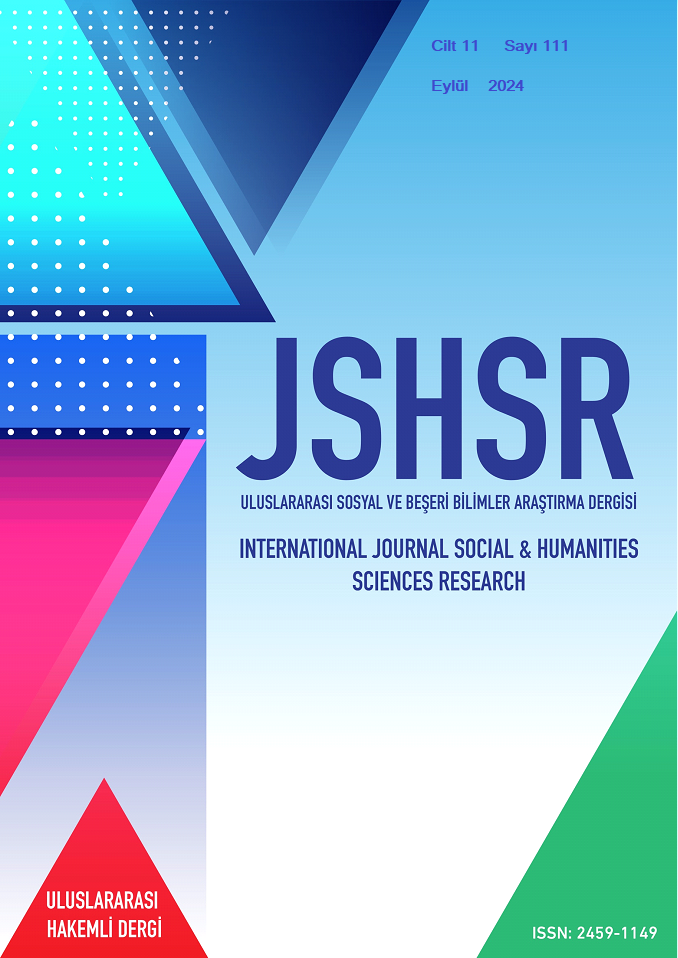Examination of Environmental Sensitivity of Faculty of Sports Sciences Students in Terms of Different Variables
DOI:
https://doi.org/10.5281/zenodo.13864041Keywords:
Environmental Awareness, Physical educationAbstract
Nowadays, with the increase in urbanization, urban people tend to move away from recreation and sports areas in urban spaces and towards nature. For these reasons, there is an increasing demand for sports activities in nature. It is not possible to consider the environment separately from human impact. Because the environment is not only the world outside us but also aplace that we influence, are influenced by and shape. The aim of this study is to determine the approaches to environmental problems and environmental sensitivity of the students of the faculty of sports sciences and to examine them in terms of different variables. Research data were collected with the Personal Information Form and Environmental Behavior Scale, which was adapted into Turkish by Timur and Yılmaz in 2013 and consists of 20 items and 6 sub-dimensions, and a valid reliability study was conducted. SPSS 26 statistical program was used to analyze the data. It is among the undergraduate documents studied at İnönü University Faculty of Sports Sciences. According to the findings obtained within the scope of the research, it was concluded that female students of the Faculty of Sports Sciences are more sensitive than male children and that the environments are developed in accordance with the age they live in and their level of education. A person is sensitive only to activities within his knowledge. It is very important for individuals to be educated and develop positive attitudes towards the environment in order to prevent and solve environmental problems. Because it is very difficult for individuals who are not environmentally conscious and insensitive to take the necessary steps for the protection and sustainability of the environment. Therefore, it is necessary to raise awareness in society about environmental awareness. It is important to repeat similar studies and continue a sustainable education process on environmental awareness.
References
Acungil, Y. (2020). Üniversite Öğrencilerinin Çevresel Tutum Ve Davranış Düzeylerini Belirlemeye Yönelik Bir Çalışma: Tokat Gaziosmanpaşa Üniversitesi Örneği. Ankara Üniversitesi Sbf Dergisi, 75 (3), 997-1032.
Akten, M. & Akten, S. (2011). ‟Rekreasyon Potansiyellerinin Belirlenmesine Yönelik Bir Model Yaklaşımı: Gülez Yöntemi‟, I. Ulusal Sarıgöl İlçesi ve Değerlendirme Sempozyumu, Sarıgöl.
Akyüz, H. Kul, M. & Yaşartürk, F. (2016). Rekreasyon Açısından Ormanlar Ve Çevre. International Journal Of Sport Culture And Science, 2 (Special Issue 1), 881-890.
Büyüköztürk, Ş. Çakmak, E. Akgün, Ö. Karadeniz, Ş. & Demirel, F. (2017). Bilimsel Araştırma Yöntemleri. Pegem Atıf İndeksi.
Büyüköztürk, Ş. Çokluk-Bökeoğlu, Ö. & Köklü, N. (2011). Sosyal Bilimler İçin İstatistik (7.baskı). Pegem Akademi Yayıncılık.
Coşanay, B. (2018). Okul Öncesi Dönem Çocuklarının (Beş-Altı Yaş) Çevresel Tutumlarının Çocuk Ve Öğretmen Değişkenleri Açısından İncelenmesi. [Yayınlanmamış Yüksek Lisans Tezi]. SB Enstitüsü, İnönü Üniversitesi.
Çabuk, B. & Karacaoğlu, C. (2003). Üniversite Öğrencilerinin Çevre Duyarlılıklarının İncelenmesi. Ankara Üniversitesi Eğitim Bilimleri Fakültesi Dergisi, 1(36), 189-198.
Demirel, M. Gürbüz, B. & Karaküçük, S. (2009). Rekreasyonel Aktivitelere Katılımın Çevreye Yönelik Tutum Üzerindeki Etkisi Ve Yeni Ekolojik Paradigma Ölçeği’nin Geçerliği Ve Güvenirliği. Spormetre Beden Eğitimi Ve Spor Bilimleri Dergisi, 7(2), 47-50.
Erol, G. (2005). Sınıf Öğretmenliği İkinci Sınıf Öğrencilerinin Çevre Ve Çevre Sorunlarına Yönelik Tutumları. [Yayınlanmamış Yüksek Lisans Tezi]. FB Enstitüsü, Pamukkale Üniversitesi.
Goldman, D. Yavetz, B. & Pe’er, S. (2006). Environmental literacy in teacher training in Israel: Environmental behavior of new students. Journal of Environmental Education, 38(1), 3–22.
Gökçe B. (1998). Toplumsal Bilimlerde Araştırma. Savaş Yayınları.
Kanbak, A. (2015). Üniversite Öğrencilerinin Çevresel Tutum Ve Davranışları: Farklı Değişkenler Açısından Kocaeli Üniversitesi Örneği. Kocaeli Üniversitesi Sosyal Bilimler Dergisi, 1(30), 77-90.
Koçak, F. & Balcı, V. (2010). Doğada Yapılan Sportif Etkinliklerde Çevresel Sürdürülebilirlik. Ankara Üniversitesi Çevrebilimleri Dergisi, 2(2), 213-222. https://doi.org/10.1501/csaum_0000000037.
Şama, E. (2003). Öğretmen Adaylarının Çevre Sorunlarına Yönelik Tutumları. Gazi Üniversitesi Gazi Eğitim Fakültesi Dergisi, 23(2), 4-46.
Timur, S. & Yılmaz, M. (2013). Çevre Davranış Ölçeğinin Türkçe ’ye Uyarlanması. Gazi Üniversitesi Gazi Eğitim Fakültesi Dergisi, 33(2), 317-333.
Torun, B. Aydemir, K. & Gül, A. (2023). Öğretmen Adaylarının Çevre Bilinci Ve Çevresel Duyarlılıklarının Farklı Değişkenlere Göre İncelenmesi. Anadolu Öğretmen Dergisi, 7(1), 1-24. https://doi.org/10.35346/aod.1250635.
Uyekı, S. & Holland, J. (2000). Diffusion Of Pro-Environment Attitudes? American Behavioral Scientist, 43(4), 646-662. https://doi.org/10.1177/00027640021955478.
Yazıcıoğlu Y, Erdoğan S. (2004). Spss Uygulamalı Bilimsel Araştırma Yöntemleri. Detay Yayıncılık.
Downloads
Published
How to Cite
Issue
Section
License
Copyright (c) 2024 INTERNATIONAL JOURNAL OF SOCIAL HUMANITIES SCIENCES RESEARCH

This work is licensed under a Creative Commons Attribution 4.0 International License.


